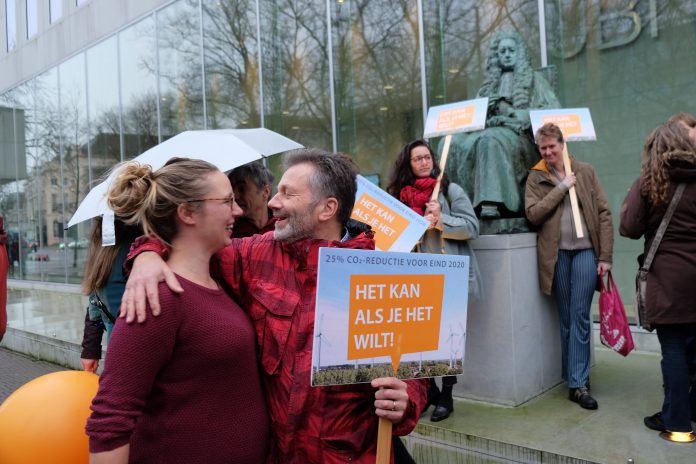
Climate activists won a final victory Friday in their long-running battle through Dutch courts to force the government to cut greenhouse gas emissions.
The country’s highest court upheld two earlier rulings ordering the government to cut emissions by at least 25% by the end of 2020 from benchmark 1990 levels.
Activists in the packed courtroom clapped and cheered as Presiding Judge Kees Streefkerk said the court had rejected the government’s appeal.
Urgenda, the Dutch climate and sustainability organization that filed the original case hailed the ruling as “a groundbreaking decision that confirms that individual governments must do their fair share to reduce greenhouse gas emissions.”
Faiza Oulahsen, of Greenpeace in the Netherlands, called it “an immense victory for climate justice.”
It is now more than four years since a court in The Hague first ordered the emissions cut in a case brought by Urgenda that spawned similar legal challenges elsewhere in the world.
The government appealed that verdict, saying that courts shouldn’t be able to order the government to take action. The government lost the appeal in October 2018, but appealed again, this time to the Supreme Court.
Friday’s ruling rejected that appeal, saying the Dutch government must act “on account of the risk of dangerous climate change that could also have a serious impact on the rights to life and well-being of residents of the Netherlands.”
Damian Rau, one of the plaintiffs that filed the case with Urgenda, said the Supreme Court decision “will set the action we so urgently need into motion and will force governments into taking their responsibility. The judgment is an example to the world that no one is powerless and everybody can make a difference.”
In the meantime, the Netherlands is approaching the target.
A report by the country’s Environmental Assessment Agency published last month estimated that greenhouse gas emissions in 2020 would be about 23% lower than 1990 levels. The agency said that the reduction could be anywhere from 19%-26%.
Scientists say global emissions of carbon dioxide and other pollutants have to start falling rapidly as soon as possible to meet the Paris goal of keeping global warming by the end of the century well bellow 2 degrees Celsius (3.6 Fahrenheit), and ideally 1.5 degrees Celsius (2.7 F).
Earlier this year, the Dutch government it announced what it called a climate agreement — a raft of measures intended to cut emissions by 49% by 2030. But it appears unlikely the action already underway will be enough to meet the goal set by the courts in the Urgenda case.
Recently, the government has stepped up action to limit pollution — including reducing the maximum speed limit on highways from 130 kph (80 mph) to 100 kph (62 mph) from early next year.
Friday’s ruling came a day after Swiss authorities announced that environmental activists in the Alpine country had collected enough signatures to force a referendum on setting specific goals for combating climate change in the constitution.
The original June 2015 ruling came in a case brought by the environmental group Urgenda on behalf of 900 Dutch citizens concerned about government inaction on climate change.
The government appealed, arguing that it effectively meant a court was formulating government policy. But appeals judges last year rejected that argument, saying that they must uphold international treaties such as the European human rights convention to which the Netherlands is a party.
Greenpeace said the government will now have to step up action to cut emissions.
“The closure of coal-fired power stations and reduction of animal factory farming are obvious measures, which the government has been postponing for years,” Oulahsen said. “Measures now will have to be drastic and the government owes that entirely to itself, because this verdict has not been taken seriously by Prime Minister (Mark) Rutte for four years.” q



















